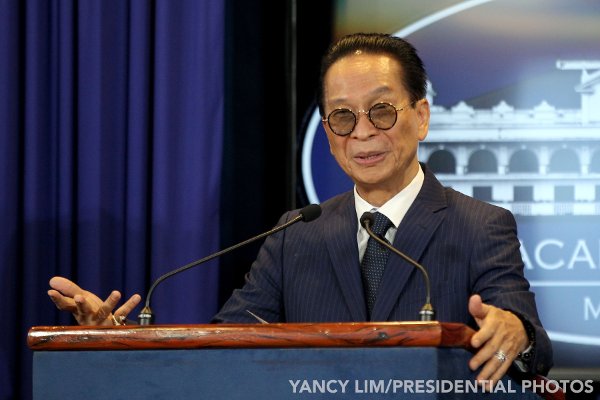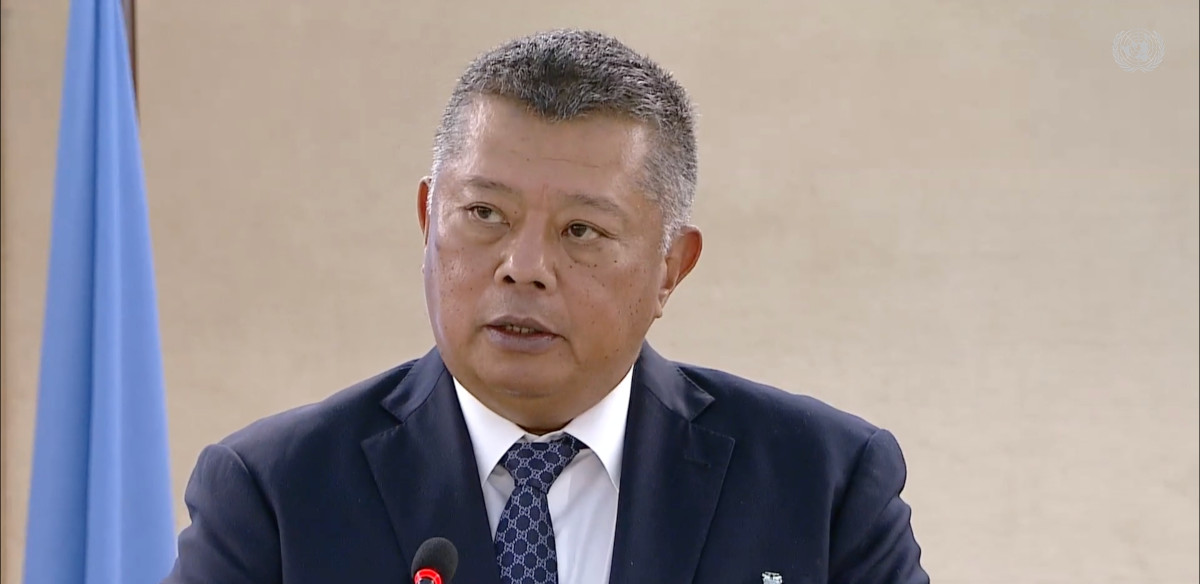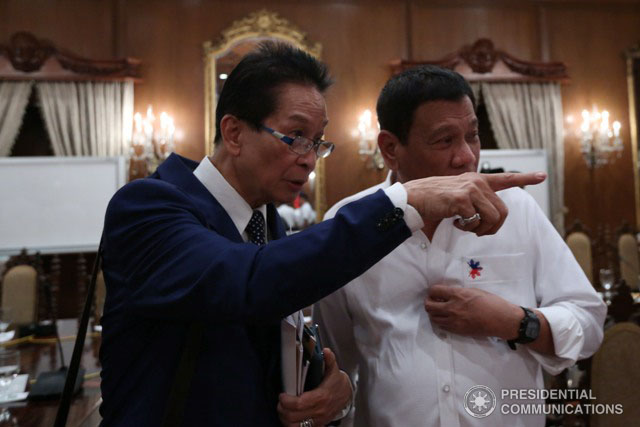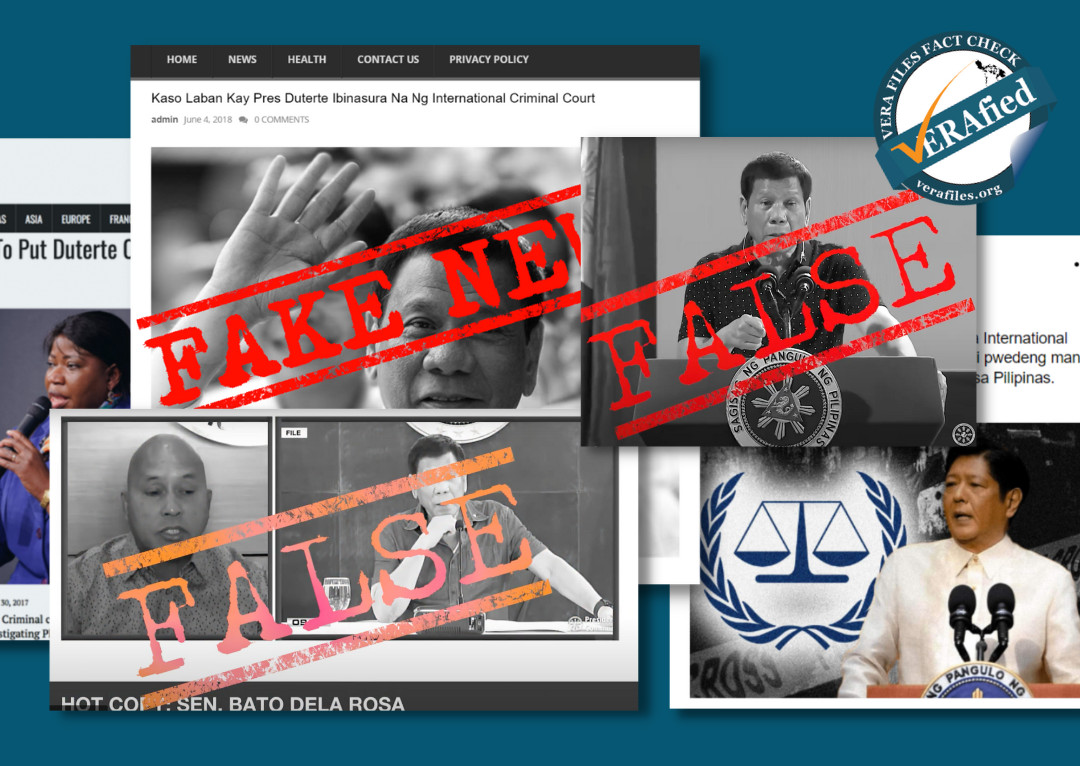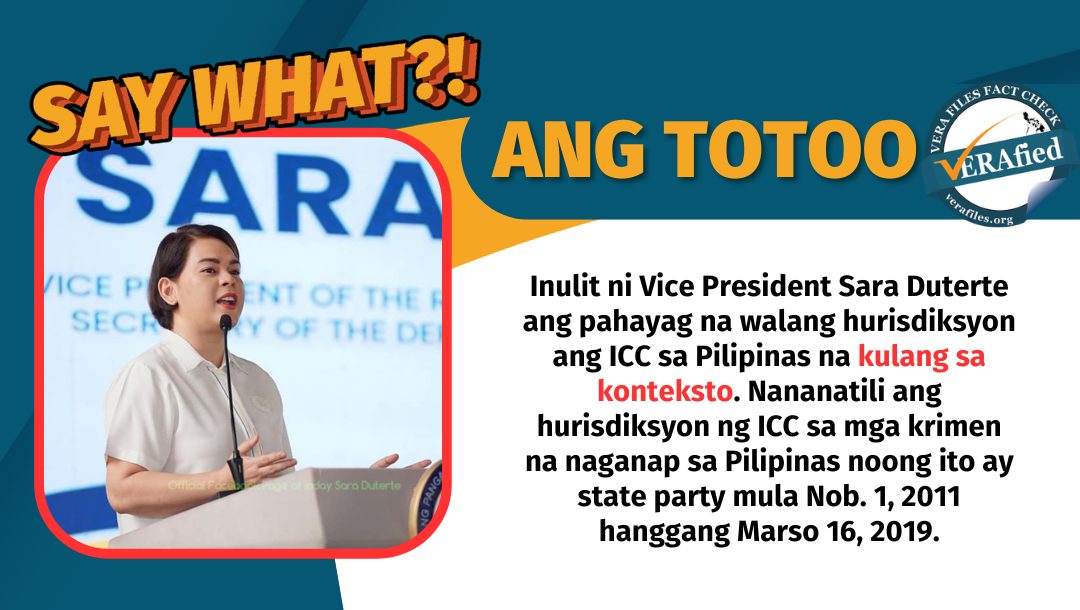Chief Presidential Legal Counsel Salvador Panelo made two inaccurate claims on the International Criminal Court’s (ICC) ongoing preliminary examination into alleged crimes against humanity committed in President Rodrigo Duterte’s war on drugs.
STATEMENT
In a Jan. 3 statement published on the website of state-run PTV news, Panelo marked the year since lawyer Jude Sabio announced he will withdraw his ICC communication against the president.
In January last year, Sabio said his submission to the ICC — in which he accused Duterte of being a “mass murderer” — was “no longer in the interest of justice” and was used as “political propaganda” by opposition figures.
Panelo said Sabio’s withdrawal “exposed the truth that the accusations against [Duterte] before the tribunal is part of the ‘vilification campaign’ orchestrated by [former Sen. Antonio] Trillanes [IV],” among others. Hence, he said:
“…it is crystal clear that the case before the ICC is politically motivated, there being no factual and legal bases.”
Source: PTV News, Chief Presidential Legal Counsel Salvador Panelo on the ICC Complaint, Jan. 3, 2021
The chief presidential legal counsel went on to say that the ICC, based in The Hague, Netherlands, has “no jurisdiction” over the Philippines or any of its officials because the country is “not … a member state” of the Rome Statute, the agreement that created the court.
He said:
“We reiterate therefore our advice to the ICC not to waste its time entertaining a case outside of its jurisdiction…”
FACT
Panelo’s first claim is misleading: the withdrawal of Sabio’s communication had “no impact” on the ICC Office of the Prosecutor’s (OTP) preliminary examination on Duterte’s war on drugs.
In an email to several Philippine news media in January last year, the OTP said a submitted communication “cannot be withdrawn,” and that the office “cannot effectively destroy or return information once it is [in] its possession or control.”
Under the regulations of the OTP, in force since April 2009, the office is required to “register and secure all information on crimes, referrals and declarations, as well as any relevant supporting documents.”
All “evidence registered” will be “subject to review by the collectors or their delegate,” which should be done taking into account “the framework presented in the case hypothesis.”
Moreover, Sabio’s 77-page submission, filed on April 24, 2017, is not the sole basis for the OTP’s preliminary examination. (See VERA FILES FACT CHECK: PNA background info on Sabio withdrawal of ICC communication misleading)
In the OTP’s 2020 report, Prosecutor Fatou Bensouda said her office “continued to engage and consult with relevant stakeholders in order to address a range of matters relevant to the preliminary examination and to seek further information to inform its assessment of the situation.”
This, on top of having reviewed:
“…hundreds of media and academic articles, reports, databases, legal submissions, primary documents, press releases, and public statements by intergovernmental, governmental, and non-governmental organizations, and other relevant sources, including [those] received through article 15 communications submitted directly to the Office.”
Source: International Criminal Court, Report on Preliminary Examination Activities 2019, Dec. 5, 2019
The OTP said it has received “a total of 52 communications” related to alleged crimes against humanity committed in Duterte’s drug war, as stated in its 2018 report.
Panelo was wrong in claiming that the ICC has “no jurisdiction” over the Philippines’ “case.” (See VERA FILES FACT CHECK: Can Duterte invoke territoriality on matters related to crimes specified in the Rome Statute?)
Even with the Duterte government’s withdrawal from the international agreement on March 17, 2018 — which officially took effect on March 17, 2019 — Art. 127 of the Statute says:
“[A State’s] withdrawal shall not affect any cooperation with the Court in connection with criminal investigations and proceedings in relation to which the withdrawing State had a duty to cooperate and which were commenced prior to the date on which the withdrawal became effective…”
Source: International Criminal Court, Rome Statute – Art. 127(2), see p. 56
Bensouda’s office has consistently reiterated its jurisdiction over alleged crimes covered by the Statute that have occured in the country while it was a member of the ICC — meaning, the period from Nov. 1, 2011 to March 16, 2019. (See PH gov’t inaction on 5,000 deaths related to drug war bolsters case vs Duterte in ICC, lawyer says)
The court’s exercise of its jurisdiction is not subject to any time limit, as stated by the OTP in its latest report. The office cited the decision of the ICC Pre-Trial Chamber in October 2017, authorizing the opening of an investigation into the situation in Burundi, which, like the Philippines, withdrew from the Statute while a preliminary examination was ongoing.
BACKSTORY
Philippine officials, including Duterte and Panelo, have previously argued that the Rome Statute was never officially enforced in the country because it was not published in the Official Gazette, as required of Philippine laws.
However, a 1997 executive order (EO) by then President Fidel V. Ramos, which provides guidelines on the negotiation and ratification of treaties and executive agreements, did not mention a publication requirement for treaties to be in effect. (See VERA FILES FACT SHEET: ICC’s preliminary examination update on drug war, explained)
EO 459, s. 1997 states that a treaty will “enter into force” once the following “domestic requirements” have been met:
The ICC prosecutor’s office said it “anticipates” to decide “in the first half of 2021” whether to pursue an investigation into the Philippine situation.
In its December 2020 update, the OTP said it found “reasonable basis to believe” that crimes against humanity of murder, torture, and infliction of serious physical injury and mental harm as other “inhumane acts” were committed in the country from July 1, 2016 to March 16, 2019 in the course of Duterte’s war on illegal drugs. (See VERA FILES FACT SHEET: Understanding the updates on the ICC’s preliminary examination into Duterte’s drug war)
Sources
ANC 24/7, ‘In the Interest of Justice’: Lawyer defends withdrawal of ICC complaint vs. Duterte, Jan. 17, 2020
GMA News Online, Lawyer Jude Sabio withdraws one of ICC cases vs. Duterte, Jan. 14, 2020
Rappler, Sabio ‘drops’ ICC communication vs. Duterte, but does it matter?, Jan. 14, 2020
Philstar.com, ICC communication ‘purely politics,’ former Duterte accuser Sabio says, Jan. 17, 2020
PTV News, Chief Presidential Legal Counsel Salvador Panelo on the ICC Complaint, Jan. 3, 2021
CNN Philippines, ICC says lawyer’s complaint vs. Duterte cannot be withdrawn, Jan. 14, 2020
Rappler, Int’l Criminal Court: Probe of drug war continues even with Sabio ‘withdrawal’, Jan. 14, 2020
GMA News Online, ICC: Communication vs Duterte can’t be withdrawn, Jan. 14, 2020
International Criminal Court, Regulations of the Office of the Prosecutor, April 23, 2009
International Criminal Court, Report on Preliminary Examination Activities 2020, Dec. 14, 2020
International Criminal Court, Report on Preliminary Examination Activities 2019, Dec. 5, 2019
International Criminal Court, Report on Preliminary Examination Activities 2018, Dec. 5, 2018
International Criminal Court, Rome Statute – Art. 127(2)
United Nations, Rome Statute of the International Criminal Court: Philippines Withdrawal, March 18, 2019
International Criminal Court, Report on Preliminary Examination Activities 2018, Dec. 5, 2018
International Criminal Court, Decision Pursuant to Article 15 of the Rome Statute on the Authorization of an Investigation into the Situation in the Republic of Burundi, Nov. 9, 2017
International Criminal Court, Burundi, n.d.
PTV News, Chief Presidential Legal Counsel Salvador S. Panelo on the ICC-OTP 2020 Report, Dec. 16, 2020
Official Gazette, Executive Order 459, Nov. 25, 1997
(Guided by the code of principles of the International Fact-Checking Network at Poynter, VERA Files tracks the false claims, flip-flops, misleading statements of public officials and figures, and debunks them with factual evidence. Find out more about this initiative and our methodology.)
